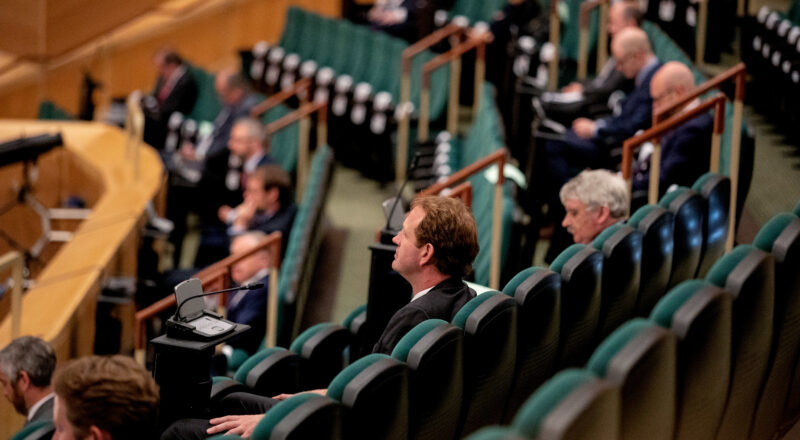Cover photo: Inside Dáil Éireann for the election of An Taoiseach. Photo by Houses of the Oireachtas, 27 June 2020. Wikimedia Commons [Attribution 2.0 Generic (CC BY 2.0)]
Volume 9, Number 2: December 2022 | Essay
Often when we picture a misshapen political situation we envision a North Korean dictatorship or a politically disoriented Russia. To a lesser extent, some may even picture the corrupt narratives of capitalistic driven politicians in the US, but rarely are politically “neutral” countries considered. As of 2021, Ireland was ranked the 13th most transparent country out of 180 in terms of bribery and corruption (Transparency International, 2022). This highlights Ireland as an ethically honest and sincere nation when it comes to governance and politics alike. However, even the most ethical nations have ongoings behind closed doors which do not coincide with their apparent orderly political performance. Through the case of Ireland, I wish to showcase that even the most politically neutral countries’ intentions should be questioned because of distorted political narratives and corruption.
To begin, I will focus on the use of political parties’ distorted narratives from the perspective of the proposed reunification of Northern Ireland with the Republic in 2020. The 1921 partition of Ireland meant that the North and the South would be divided. While this meant governing independence for the Republic of Ireland, it also meant that six counties would be governed under British rule. This act was signed under the Good Friday agreement, which acknowledged that the majority of Northern Irish were complacent with a protestant-British rule. The thought of a reunified Ireland seemed a distant and unachievable one until Brexit, which left Northern Ireland in a complicated situation. With the proposal of a reunification on the table, many politicians set their narrative in hope to capture the following of the people. One of the biggest arguments of the Ulster Unionist party of Northern Ireland, those against the reunification, was the financial cost. Their argument was based on the poor economic situation of Northern Ireland; that Ireland would be unable to take on. However, when these costs were broken down, the majority stemmed from pension payments, that the UK government would still be liable for as they were based on contributions made to the UK. The second largest cost came from Northern Irish defence spending, which would dissipate, if reunited under a single Irish nation (The Irish Times, 2019). Of course, the unionist party were not the only ones shaping their narrative to sway voters. The nationalist party, Sinn Féin, focused on the Good Friday Agreement, stating that the majority vote from Northern Irish would erase their union with the UK. However, in reality, the majority of Northern Irish were still in agreement with the union, despite the complex Brexit situation. Certainly, both parties also pushed narratives based on the truth, but not always. All in all, the political narrative is one that should be proceeded with caution, even in the most unexpected political cases.
Next, the revealment of corruption in the Irish Parliament is necessary to demonstrate that their politics are not always as transparent as they may seem. Moreover, this is important to demonstrate as the political agenda may not always have the people’s best interests at heart. Ireland is by no means short of political scandals in the past decades, ranging from embezzlement and tax evasion to the collection of money from affiliated businessmen. Former Minister for Foreign Affairs, Ray Burke, was imprisoned after receiving over £200,000 in corrupt payments, while also evading tax on these payments. Michael Collins, a member of the Irish Parliament set up an offshore account to avoid over €130,000 in taxes, while chief executive of the Anglo Irish Bank was guilty of receiving financial assistance from a group of businessmen in order to boost the share price of Anglo Bank’s stock. Even former Prime Minister, Bertie Ahern, was alleged to have received money from a millionaire businessman, regarding certain planning permissions in Dublin (The Journal, 2018). No one country is completely free of corruption within the political sphere, but it is imperative to not blindly acknowledge political decisions as a given, without doing the necessary research. Transparency International Ireland (n.d.), points out that not all Irish are blind to corruption: with 65% of survey respondents agreeing that there is not enough transparency and supervision of the financing of political parties and 44% agree that there is too close links between business and politics. Given these responses, it leaves one to wonder how Ireland is still ranking extremely high in political transparency. These several instances of blatant corruption at even the highest end of the political Parliament in Ireland, illustrate the absolute need to question political agendas regardless of how ethical they may appear.
In conclusion, as depicted in the case of Ireland, political intentions may become highly skewed because of a need to capture voter attention or because of corrupt practices. Unfortunately, it is not often the case that politicians don’t distort their narrative in favour of public opinion. The designing of democratic politics gives people the ability to choose, while these options are highly distorted to fit their apparent needs. Often, the narrative given does not align with the truth. Thus, it is essential to be cautious of these narratives in any political sphere, whether it be Ireland, the U.S or Russia. Moreover, corrupt practices do not escape the governance of seemingly ethical and honest nations. These practices may not be on direct display as witnessed in extreme cases such as North Korea, which means that we should be all the more wary of what is happening behind closed doors.
References
6 Irish scandals that journalists have brought to light. (2018, May 11). The Journal. https://www.thejournal.ie/6-irish-scandals-that-the-media-brought-to-light-4007146-May2018/
Burke-Kennedy, E. (2021, May 2). Northern Ireland’s £9.4bn subvention and the cost of Irish unity. The Irish Times. https://www.irishtimes.com/business/economy/northern-ireland-s-9-4bn-subvention-and-the-cost-of-irish-unity-1.4553553
Perceptions of Corruption in Ireland (n.d.). Transparency International Ireland. https://transparency.ie/news_events/perceptions-corruption-ireland
Transparency International Ireland (2022). Transparency International . https://www.transparency.org/en/countries/ireland











































